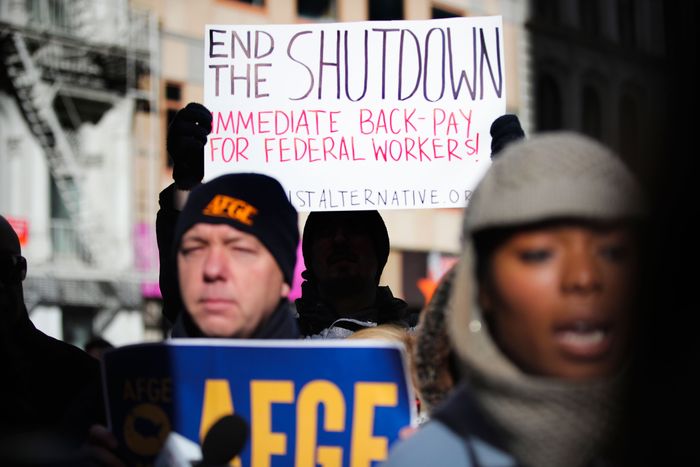
The longest government shutdown in American history is over for now. On Friday afternoon, Donald Trump announced a deal to reopen government for the next three weeks. The short-term appropriations measure notably includes no funding for his beloved border wall — or steel slat fence, or smart wall, or whatever else he decides to call it in the future. It’s a major loss for Trump, who campaigned on being the king of the deal and had repeatedly insisted he would not reopen government without funding for the wall. He is not quite ready to admit total defeat, as NBC News reported on Friday. “We really have no choice but to build a powerful wall or a steel barrier,” he said in his Rose Garden speech. “If we don’t get a fair deal from Congress, the government will either shut down again on February 15, or I will use the powers afforded to me under the laws and the Constitution of the United States to address this emergency.”
A national emergency is the only card Trump has left to play. He has no other leverage left. Two parties deserve credit for the president’s humiliating defeat. One is Speaker of the House Nancy Pelosi, who mostly kept her party united as Trump dug in his heels. And on Friday, commentators duly showered her with praise:
Pelosi absolutely deserves credit for keeping her fractious party in line. But any analysis that credits her as the sole or even principal factor in ending the shutdown misses the real story. Trump announced his deal hours after air traffic controllers brought flights in several of the nation’s busiest airports to a crawl. Controllers have missed two paychecks — as have hundreds of thousands of other federal workers and subcontractors. Hours after the Federal Aviation Authority announced severe delays at LaGuardia, Newark, and Hartsfield-Jackson airports, Sara Nelson, the head of the flight attendants’ union, publicly urged her members to mobilize “immediately” against the shutdown by visiting the offices of their congressional representatives. “If air traffic controllers can’t do their jobs, we can’t do ours,” she told New York on Friday.
Air traffic controllers and flight attendants didn’t act alone. The Washington Post reported that 14,000 IRS workers did not show up to their (unpaid) jobs this week. Previously, multiple outlets reported a spike in the number of TSA agents calling out of work sick — though they were not sick, at least not in the physical sense. They suffered from circumstances they did not create. The virus was political in origin. They did not go to work because they could not afford to, because some were sleeping in their cars. And indignities spread the longer the shutdown dragged on. At least one other federal worker said that she had begun to ration her insulin. Food banks scrambled to meet demand. GoFundMe pages proliferated while the president and a billionaire member of his cabinet went on TV to suggest, on the same Thursday, that workers either go further into debt or ask for credit at the grocery store to get by.
Workers bore the cost of the shutdown, and it shouldn’t surprise anyone that they began to revolt. By withholding their labor, they redirected the pain the Trump administration had inflicted upon them. Their actions were not strikes in the formal definition, because that option is not legally available to most workers affected by the shutdown. (Coast Guard families can beg for rent money on GoFundMe, but if they strike, well, that’s a mutiny.) So workers did what they could, where they could. And it was enough.
The end of the shutdown might be temporary; who knows where we’ll be three weeks from now. But Trump’s pathetic Rose Garden speech is as much a victory for labor as the contract that striking Los Angeles teachers wrung out of their school district. And workers don’t need a ticker-tape parade now that it’s over. Subcontractors need back pay — and workers in all sectors need government that functions. Pelosi’s next battle must be for them. Workers will need all of her mettle in the days to come.






























